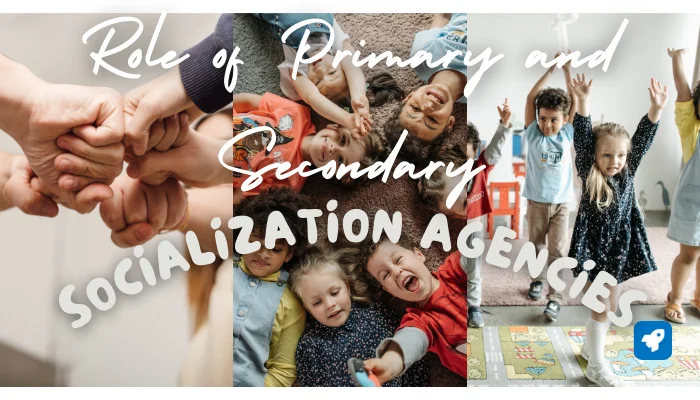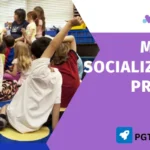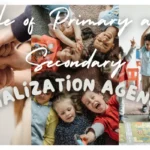The socialization process, shaped by the role of primary and secondary socialization agencies, plays a crucial part in an individual’s development.“Do you know why parents are considered your first teachers, how home influences your initial social behaviors, and how schools contribute to your social skills and knowledge?”
Primary socialization occurs at home, where Parents are our first teachers because they shape our early social behaviors, norms, and values from birth. The home environment is crucial in our initial understanding of the world. Secondary socialization happens in school, where children learn formal rules and discipline, and help us navigate societal expectations. This socialization process is essential for preparing us to live within a community. Institutions like Kendriya Vidyalaya Sangathan (KVS), NCERT, and NIOS play a key role in ensuring continuity between home and school.
Let’s explore this socialization process in detail. role of primary and secondary socialization agencies
Socialization is the process through which individuals learn and internalize these societal elements, and it plays a pivotal role in shaping who we become.
To fully understand the importance of socialization, it’s essential to explore its concept, types, significance, and the factors that influence this process.
Before moving forward, make sure to stay updated with all our latest articles by subscribing to our Telegram channel at t.me/pgtprime and following our Facebook page at facebook.com/pgtprime.In the following discussion, we will delve into the roles of primary and secondary socialization agencies, Now let’s start.
What is Socialization Process
Socialization is an interdependent process that occurs between an individual and society. Through socialization, we learn to understand, appreciate, and adhere to societal norms. This process makes individuals aware of the behaviors expected of them, in alignment with the norms, beliefs, attitudes, and values of the society in which they live.
The socialization process is the lifelong journey through which individuals learn and internalize the norms, values, beliefs, and behaviors expected by their society. It begins in early childhood and continues throughout life as people interact with different social institutions, such as family, schools, peers, media, and the workplace.
Thus, we can say that an individual first adapts to their familiar environment, then to the educational environment, and finally to the broader social environment before being fully accepted by society. This progression represents the complete process of socialization, also known as the socialization process.
Don’t forget to check it out: All About Pedagogy useful in any Teaching Exams.😜
Types of Socialization process
The socialization process can be categorized into several types, each of which plays a distinct role in shaping an individual’s social development:

Role of primary and secondary socialization agencies
1. Primary Socialization Role of primary and secondary socialization agencies
- Occurs in Early Childhood: This is the first stage of socialization, where a child learns the basic norms, values, and behaviors from close family members, typically parents and caregivers.
- Foundation for Later Socialization: It forms the foundation for all future socialization as it instills the basic social and cultural frameworks.
2. Secondary Socialization Role of primary and secondary socialization agencies
- Occurs During Later Childhood and Adolescence: This type of socialization happens when children go to school and interact with peers, teachers, and other members of society.
- Learning Specific Roles: It involves learning the norms and behaviors associated with specific social roles, such as student, friend, or teammate.
3. Anticipatory Socialization Role of primary and secondary socialization agencies
- Preparing for Future Roles: This involves learning behaviors and norms for roles one will take on in the future. For example, a teenager might start adopting behaviors of adults to prepare for adulthood.
- Voluntary Process: Individuals voluntarily adopt the values and standards of a group they aspire to join, such as a profession or social class.
4. Developmental Socialization Role of primary and secondary socialization agencies
- Continuous Learning and Adjustment: This type of socialization is about acquiring new norms, values, and behaviors as one grows older and takes on new roles, such as becoming a parent or starting a new career.
- Ongoing Process: It reflects the ongoing nature of socialization as individuals continue to adapt to changes in their lives and society.
5. Resocialization
- Radical Change in Behavior: This involves unlearning old behaviors and norms and learning new ones, typically in a situation where a person is introduced to a new environment, such as moving to a different country, entering the military, or joining a religious group.
- Can Be Voluntary or Involuntary: Resocialization can be a voluntary process, like converting to a new religion, or involuntary, such as in the case of imprisonment.
6. Organizational Socialization Role of primary and secondary socialization agencies
- Integration into an Organization: This type involves learning the norms, values, and behaviors necessary to function within an organization, such as a workplace or a club.
- Adapting to Professional Roles: It includes learning the specific skills and behaviors required for professional roles.
7. Gender Socialization Role of primary and secondary socialization agencies
- Learning Gender Roles: This process involves learning the behaviors, attitudes, and expectations associated with one’s gender as defined by society.
- Influence of Culture and Media: It is heavily influenced by cultural norms, family expectations, and media representations.
Don’t forget to check it out: All about KVS Where you get Previous Year Question Paper, Eligibility & Syllabus😜
Importance of Socialization process
| Aspect | Description Role of primary and secondary socialization agencies |
|---|---|
| Formation of Identity | Self-Concept Development: Socialization helps individuals develop their self-concept and personal identity. Through interactions with others, people learn who they are, what they believe in, and how they fit into society. Sense of Belonging: It fosters a sense of belonging, as individuals come to identify with particular groups, such as family, community, or nation. |
| Cultural Continuity | Transmission of Culture: Socialization is the primary means by which cultural norms, values, beliefs, and traditions are passed from one generation to the next, ensuring cultural continuity. Preservation of Social Order: By instilling shared norms and values, socialization helps maintain social order and cohesion within a society. |
| Learning Social Roles | Understanding Expectations: Through socialization, individuals learn the expectations associated with different social roles, such as those of a student, parent, or employee. Role Performance: It equips people with the knowledge and skills needed to perform these roles effectively in various social settings. |
| Social Integration | Community Participation: Socialization encourages individuals to participate actively in their communities, contributing to the social fabric. Building Social Networks: It helps people build social networks and support systems, which are important for personal well-being and resilience. |
Don’t forget to check it out: Haryana HPSC PGT Screening Paper PDF 2023😜
Factor of Process of Socialization
Socialization is the process of learning group norms habits and ideas. There are four factors in this process of learning, these are imitation, suggestion, identification, and language. let’s understand it.
| Factor | Description Role of primary and secondary socialization agencies |
|---|---|
| Imitation | The process where individuals, especially children, learn by copying the behaviors, actions, and mannerisms of others, particularly those they see as role models. |
| Suggestion | The process by which ideas, feelings, or attitudes are communicated indirectly, influencing an individual’s thoughts or actions without direct instruction. |
| Identification | The process where individuals adopt the values, beliefs, and behaviors of others, particularly those they admire or aspire to be like, shaping their self-concept. |
| Language | The primary tool for communication and thought, enabling individuals to understand, internalize, and express social norms, values, and ideas within a culture. |
Don’t forget to check it out: All about HTET ( Level 2 & 3)😜
Agents of Socialization process
Role of Primary and Secondary Socialization Agencies
| Primary Socialization Agencies | Secondary Socialization Agencies |
|---|---|
| Family: The First School of Life! | Schools: Shaping Minds, Building Futures. |
| Parents: Your First Teachers, Your Forever Guides. | Peers: Friends Today, Influencers Forever. |
| Home: Where Values and Norms Begin.” | Media: The Window to the World Beyond. |
| Family Bonds: The Foundation of Your Social World. | Teachers: Lighting the Path to Knowledge. |
- Role of Family in Socialization Process – Language is acquired from the family during childhood, and they continue to teach gender role behavior, both consciously and unconsciously, throughout this period.
- Role of Peers in Socialization Process – Within the peer group, young children learn to conform to the group’s accepted norms and understand that rules govern social life. Peer influence can be both positive and negative. If negative, children may develop adverse attitudes, deviate from expected behavior patterns, and potentially engage in delinquent activities.
- Role of Mass Media in Socialization Process – Mass media plays a crucial role in the socialization process by shaping attitudes, beliefs, and behaviors. It exposes individuals to societal norms, cultural values, and global perspectives, influencing both positive and negative behavior.
- Role of Teacher in Socialization Process – They foster social skills, promote cultural understanding, and encourage respect for diversity, helping students integrate into society as responsible citizens.
- Role of School in Socialization Process – Schools not only teach reading, writing, and fundamental skills but also guide students in personal development, self-discipline, cooperation with others, adherence to rules, and assessing their achievements through healthy competition.
Ensuring home school continuity
Ensuring home-school continuity means establishing a smooth link between a child’s learning experiences at home and at school. This can be accomplished through regular communication between parents and teachers, aligning educational goals, and promoting parental involvement in school activities. Consistent routines, shared expectations, and reinforcing learning both at home and school create a supportive environment that nurtures a child’s academic and social growth.
Ensuring home-school continuity involves several key practices:
- Regular Communication: Maintain ongoing dialogue between parents and teachers to stay informed about the child’s progress and address any concerns promptly.
- Aligned Educational Goals: Ensure that the learning objectives at home and school are consistent, helping the child to focus on common targets.
- Parental Involvement: Encourage parents to participate in school activities, events, and meetings to foster a stronger connection with the educational environment.
- Parental Education: Offer resources and workshops to help parents understand the curriculum and effective strategies for supporting their child’s learning at home.
- Reinforcement of Learning: Support and reinforce concepts learned at school with activities and discussions at home to deepen understanding.
- Feedback Loop: Create a system for regular feedback between home and school to monitor the child’s progress and adjust strategies as needed.
Socialization process in the classroom with respect to Inclusion
The socialization process in the classroom, particularly with respect to inclusion, is crucial for fostering a learning environment where all students feel valued, respected, and connected. Here’s how socialization and inclusion work together in the classroom:
- Inclusive Culture: Teachers create a classroom culture that celebrates diversity and teaches appreciation for different abilities, backgrounds, and perspectives.
- Collaborative Learning: Group activities promote interaction among diverse peers, fostering empathy, teamwork, and respect.
- Differentiated Instruction: Tailored teaching methods ensure all students can participate meaningfully, regardless of their abilities.
- Modeling Behavior: Teachers model fairness and respect, setting standards for inclusive student interactions.
- Peer Support: Buddy systems and mentoring help students support each other, enhancing belonging and reducing isolation.
- Open Dialogue: Opportunities for discussion foster understanding of inclusion and socialization in a diverse environment.
- Inclusive Curriculum: Diverse materials and lessons ensure all students feel represented and valued.
- Parental Involvement: Engaging parents reinforces the school’s commitment to diversity and supports inclusion at home.
- Continuous Assessment: Regularly monitoring social dynamics helps identify and address exclusion, promoting inclusion.
Conclusion on Role of Primary and Secondary Socialization Agencies Ensuring Home School Continuity
In conclusion, primary and secondary socialization agencies—like the family and school—are essential in shaping a child’s development. The family provides the foundational social behaviors and values, while schools enhance these by further developing social skills and knowledge. Ensuring home-school continuity through strong communication, aligned goals, and consistent routines creates a supportive environment that fosters a child’s academic and social growth, enabling them to thrive in both home and community settings.
Please let us know through the comment section if you want any topic to be discussed in this blog. We will try to provide an article on that subject as early as possible.
Please leave your valuable comment in the comment box! Your comments are valuable to us.












THANK YOU VERY MUCH FOR SUCH CRISP AND TO THE POINT NOTES.YOU ARE DOING GREAT WORK.THANKS A LOT .